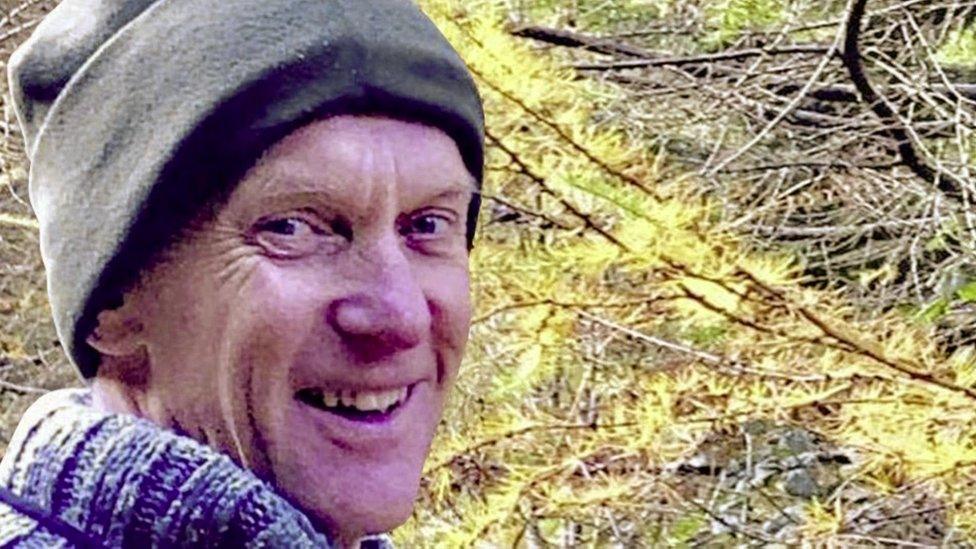Dr Michael Watt: Neurologist removed from medical register
- Published

Dr Michael Watt is at the centre of Northern Ireland's biggest patient recall
Former Belfast Trust neurologist Dr Michael Watt has been removed from the medical register - meaning he can no longer practise medicine in the UK.
The Medical Practitioners Tribunal Service (MPTS) made the move after Dr Watt made a voluntary application to be removed from the register.
His work and its oversight is subject to three ongoing high-level inquiries.
Concerns over his clinical practice prompted the biggest ever patient recall in Northern Ireland.
The MPTS hearing happened in private.
MPTS hearings are normally held in public - except where the circumstances of the case are viewed to outweigh the public interest or where details of a doctor's health are being considered.
The MPTS makes independent decisions about cases referred by the General Medical Council (GMC).
'Extremely disappointed'
In a statement the GMC said Dr Watt's patients had suffered "immense harm" and that its thoughts were with them and their families.
The GMC said it was "extremely disappointed" that the MPTS had allowed Dr Watt's voluntary application to be removed from the register, as the GMC "felt it was in the public interest for the allegations to be heard by the tribunal in an open and transparent way".
Health Minister Robin Swann said it was "another distressing day in what has been a long sequence of distressing days for former patients of Dr Watt and their families".
He added: "There was an expectation of a full GMC hearing and there will be profound disappointment that this is not happening. I very much share that disappointment.
"I can assure patients and families that I am determined to do everything in my power to repair the damage inflicted on public confidence by the neurology recall."
North Belfast Sinn Féin assembly member Carál Ní Chuilín tweeted to say she had been in contact with some members of a group of recalled patients who were "devastated".
SDLP North Belfast asssembly member Nichola Mallon said her thoughts were with the patients of the former neurologist.
"While it's welcome that Dr Watt has been now been removed from the medical register and can no longer practice medicine it would have been preferable for patients if a public tribunal was held to remove him so the full case could be heard," she said.
Allow X content?
This article contains content provided by X. We ask for your permission before anything is loaded, as they may be using cookies and other technologies. You may want to read X’s cookie policy, external and privacy policy, external before accepting. To view this content choose ‘accept and continue’.

'Once in a blue moon'

Dr Michael Watt removed from medical register
This action by the MPTS has not only disappointed the General Medical Council but also the many patients who have told their very private stories in public.
There are those who will feel let down by the move, while others are angry - even devastated - that the allegations were not heard by many instead of just a few.
It's also rare for the GMC to voice its anger in such a public way.
Its public denouncement of the tribunal's decision only happens as one source said "once in a blue moon" .
These things are normally said in private.
It is also rare that voluntary applications to be "erased from the register" are granted. In fact, just eight have been issued in the past three years.
Northern Ireland is now facing a number of public inquiries.
They are often, contentious, long running and expensive.
Today's move by the MPTS may not instil confidence among those who are due to take part.

Wrong diagnosis
In May 2018, the Belfast Trust recalled 2,500 patients for review after concerns were raised about the clinical work carried out by Dr Watt at the Royal Victoria Hospital in Belfast.
This was followed by a further 1,044 patients who were recalled in November 2018.
A report has found almost 20% of patients seen by Dr Watt were given a wrong diagnosis.
An independent inquiry has been hearing evidence since September 2018 and has concluded oral evidence.
At the end of September, it emerged that interactions with a patient by the former neurologist had also raised serious concerns, according to a medical ethics expert.
London-based barrister Daniel Sokol reviewed evidence obtained by BBC Northern Ireland's Spotlight programme, including text messages between Dr Watt and the female patient that were sent between 2017 and 2020.